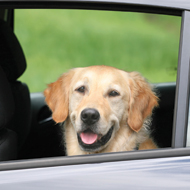Response to dogs in hot cars petition

The campaign calls for a change in the law, making it illegal to leave a dog in a hot car for long enough to cause discomfort.
The government has said it will not amend the Animal Welfare Act to include a specific ban on leaving dogs in hot cars. The statement was made in response to an online petition which closed at the end of last month with just over 10,000 signatures.
Shopping centre manager Claire Grundy launched the petition last year after repeatedly seeing dogs being left in hot vehicles in her store's car park. Staff became increasingly saddened and frustrated at the sheer number of cases and the lack of action taken against irresponsible owners.
Speaking in September when the petition started, Claire said in her experience police action is only taken when a dog dies as a result of being left in a car.
The campaign calls for a change in the law, making it illegal to leave a dog in a hot car for long enough to cause discomfort.
In its response to the petition, the government wrote: 'The Animal Welfare Act is one of the most comprehensive pieces of legislation to protect animal welfare anywhere in the world. There is therefore no need to change the law as suggested.'
It went on to outline the current penalties for cruelty to animals or for failing to provide for its welfare needs, which can be punishable by banning the owner from keeping animals, or imposing unlimited fines or jail time.
Referring to leaving dogs in hot cars, the statement reads: 'There have been occasions in the past where prosecutions have been made to those who have left dogs in hot cars, resulting in the death of the animal. Therefore there is no need to amend the Animal Welfare Act as it stands because this falls under the existing legislation.'
The campaign is ongoing and has a new name, TeamOtisUK, named after Claire's own rescue dog Otis.



 The latest
The latest